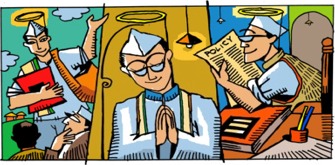When Tamilnadu chief minister Jayalalithaa wielded the employment axe on hundreds of thousands of government servants, there was little sympathy for their plight outside their own circles. The public remembers - and suffers to this day - decades of administrative misrule from civil servants who cannot be bothered with civility or service. Intervention from the Supreme Court, and the inevitability of having to continue the work of government, returned the majority of the fired workers to their jobs, but with proper notice that they aren't as indispensable as they would like to believe.
Whether these actions are motivated by political calculations alone - one often hears that many state employees in Tamilnadu are partial to the opposition DMK party - is debatable. What is certain, however, is that Jayalalithaa's actions were vastly more tolerable because of the widespread disdain for government employees. With public servants of various stripes being hauled off to stand trial for financial and other irregularities in Maharashtra and Delhi, the rotten-ness remains front and center. Good governance, it is clear, is not the natural consequence of holding elections every few years.
Which brings us to the question: with the pillage of India by powerful interests more brazen than in times past, and with civil servants either indifferent to or complicit in this, what reasonable person can look forward to a time of accountability and integrity from administrators?
The answer, unexpectedly, is 'everyone'.

But finding good people within the system and bring reforms in partnership with them is a task easier talked about than accomplished. This is primarily because responsible government functionaries face their hardest obstacles from within.
First, a systemic and vicious interlock exists between our failed political process and its many crony stakeholders for work done by and within governments at every level. There are political and organizational odds that exist for well-meaning legislators and administrators to push through systematic change. For officials acting alone - Satyendra Dubey being the most recently prominent of them - the risks are even higher. Diligence and integrity on behalf of the public good irks superiors and others who may then discredit and reverse their work. Worse still, as in Dubey's case, the nexus between money managers and criminals can prove fatal to honest employees.
There are still other problems for responsive administrators within government. Ever-imminent transfers, unncooperative and bought-off fellow officials, unproductive and time consuming meetings because of inadequate workforce capacities and unclear pinning of responsibilities, all place a massive burden on good officials. Whether they work to reform governments on the inside or its external services, the balancing act for the courageous and the diligent insider is a tough one.
Despite these challenges, some alliances of elected officials, able administrators, and citizens groups have partnered to set reforms processes for governance in motion. The successes in Andhra Pradesh, Karnataka, and Rajasthan will most definitely be regarded for the exceptional place they will in India's public policy history.
What then are the lessons then about government for today's citizens?
First that there are good people within government, especially within the local and regional governments that are closer to citizens. Second, successful partnerships only call for more such partnerships, not less. Third, there is little doubt that there is a pool, small or large, of restive and willing citizens whose energies have yet to be tapped and coalesced positively. Four, the quality of processes and skills within governments are by and large such that much of citizen participation may well have to come in the form of function-specific and focussed alliances, aside from vigilance and advocacy.
The unconsciously absorbed view - that even the responsible few within governments are best watched and critiqued by everyone from the ringside - must not continue to hold in default. The rejuvenation of the political process is deeply desired by many Indians. This is a non-partisan force that can be channeled toward greater citizen involvement, even though cynicism and years of divisive agendas have prevented a more explicit and collective statement of it. When seen in this light, good people within our governments are opportunities for citizens to push for ever greater improvements.
